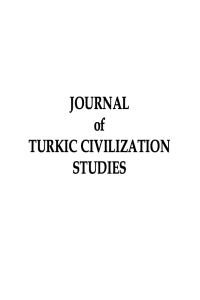Öz
The history entitled Mustafād al-Akhbār fī Ahwāl Qazān wa Bulghār (Collection of Information on Kazan and Bulghār)1 by Shihāb al-Dīn Merjānī (1818- 89), a renowned theologian and historian of the Volga Tatars, is held in high regard as the first national history of the Volga Tatars who referred to themselves as Bulghār or Muslim.2 But this work is not merely a history of the Tatar Muslims of the Kazan region. It also describes the history of Bukhara and other parts of Mā warā’ al-nahr (the oasis areas beyond the Amu River called by the Arabs who conquered the southern part of Central Asia since the end of the seventh century) and includes a wealth of references to the cultural and historical links between the Kazan region and Bukhara. For example, the biographies of mullas from the Kazan region included in the vol. 2 show that many of the mullas who were active in the Kazan region from the late eighteenth to the mid-nineteenth centuries studied in Bukhara, and they thus give a clear indication of the great influence that the Islamic culture of Bukhara had on this region.
Kaynakça
- Shihāb al-Dīn Merjānī, Mustafād al-Akhbār fī Ahwāl Qazān wa Bulghār, I-II (Kazan, 1885- 1900; hereafter: Mustafād). It was through the good offices of the late Mahmud Tahir that I was able to access this work and the work cited in note 6. I wish to take this opportunity to express my gratitude to him. Recently this important work was reprinted in Turkey: Şehabeddin Mercani, Müstefad’ül-Ahbar fi Ahval-i Kazan ve Bulgar, 1-2, Kazan, 1897-1900, tıpkıbasım (Ankara: Türk Kültürünü Araştırma Enstitüsü, 1997). Since the perestroika period new researches regarding Merjānī have appeared in Tatarstan. For example see: Мерджани: ученый, мыслитель, просветитель (Казань, 1990).
- A. Battal-Taymas, Kazan Türkleri, 2nd ed. (Ankara, 1966), p.130; A.N. Kurat, “Kazan Türklerinin ‘Medeni Uyanış’ Devri (1917 yılına kadar),” Ankara Üniversitesi DTCF Dergisi, 24: 3/4 (1966), p. 105; Taтaры Среднего Поволжья и Приуралья (Moсквa, 1967), cc. 24-25.
Ayrıntılar
| Birincil Dil | Türkçe |
|---|---|
| Konular | Tarih Sosyolojisi |
| Bölüm | Araştırma Makalesi |
| Yazarlar | |
| Yayımlanma Tarihi | 30 Haziran 2006 |
| Yayımlandığı Sayı | Yıl 2006 Cilt: 2 Sayı: 1 |
Journal of Turkic Civilization Studies © 2022 by TUAUM is licensed under Attribution-NonCommercial 4.0 International
Journal of Turkic Civilization Studies by TUAUM is licensed under Attribution-NonCommercial 4.0 International

